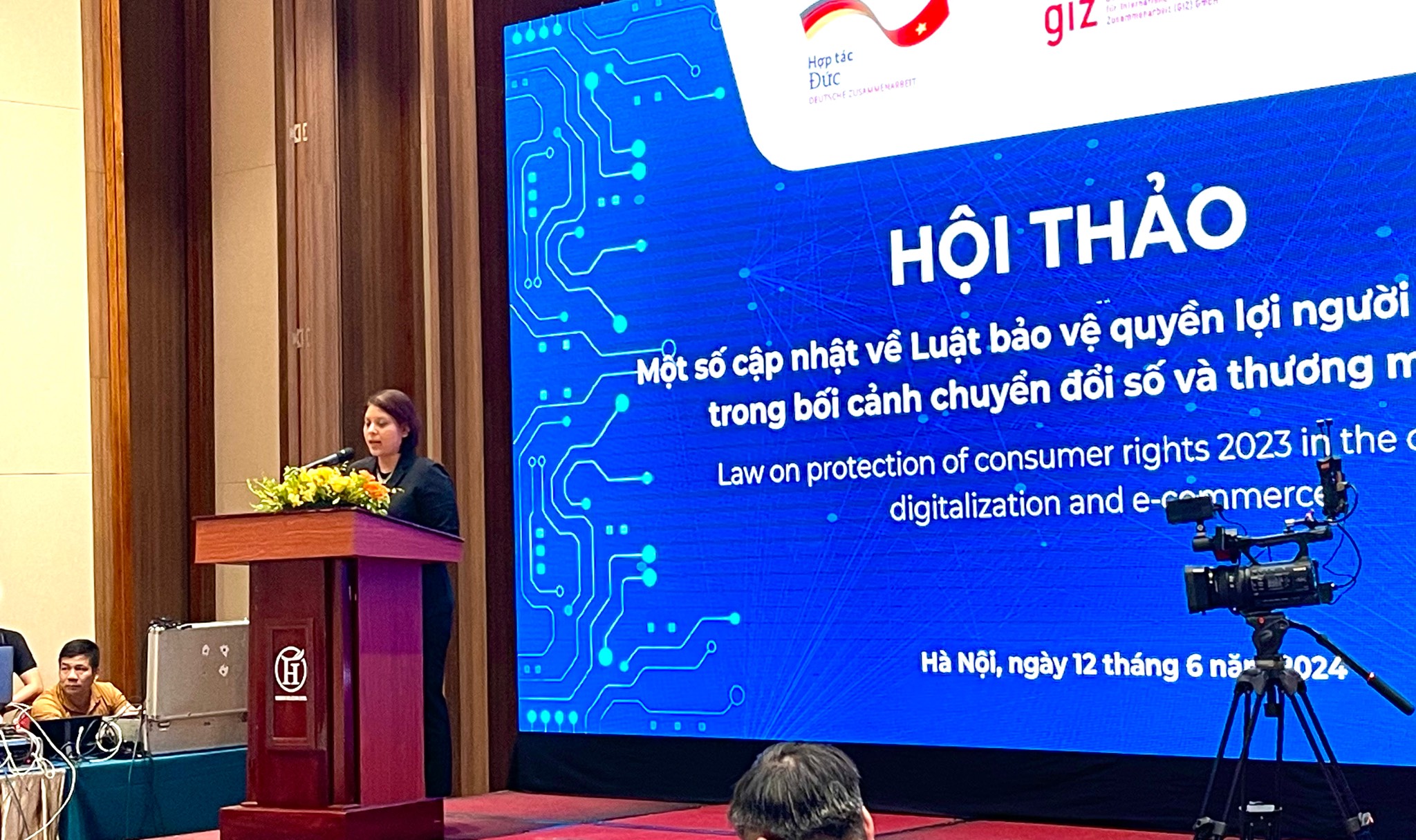Many experts addressing the “Updates on the Law on the Protection of Consumer Rights 2023 in the Context of Digitalization and E-commerce” seminar, organized by the Agency for Enterprise Development (AED) at the Ministry of Planning and Investment and the German Agency for International Cooperation (GIZ) on June 12, touched on the opportunities and challenges that both businesses and consumers may encounter during the strong development of digital transformation and e-commerce.
Potential & problems
Information technology’s rapid development over the past decade has changed how commercial transactions are conducted. They can now be readily conducted over the internet, on the vendor’s website or on third-party platforms, making cross-border transactions much more straightforward.
Ms. Pham Que Anh, an expert at GIZ, said that with the development of digital transformation and e-commerce in Vietnam, markets for enterprises will expand beyond national borders, thereby increasing the number of customers for vendors and boosting their export activities.
Operating costs for businesses will be cut significantly and economic efficiency will increase from not needing to rent office space or retail outlets and not being constrained by specific business hours. Businesses will be able to leverage new technologies to research markets and gather information on consumer preferences. Small businesses also have the opportunity to access larger markets through new business models such as platform economics or social media commerce.
Consumers, meanwhile, will also have more purchase opportunities when using e-commerce platforms. There is a greater choice of goods at competitive prices due to expanded market boundaries. Buying and selling will be more convenient and efficient as consumers can compare different options and suppliers on digital platforms and e-commerce platforms, thereby lowering their spending.

Alongside the opportunities from operating on e-commerce platforms, however, businesses and consumers are also likely to face several challenges. Among these, a lack of understanding about international law or laws in other countries may lead to difficulties for some businesses, with them becoming entangled in disputes related to consumer protection and other areas. “Issues like online fraud, unhealthy competition, or abuse of dominant market positions by large internet companies will also pose significant challenges for businesses,” Ms. Que Anh believes.
As for consumers, they will also face certain issues. Consumer privacy may be threatened by data collection without consent, tracking, and the leaking of personal information. In addition, many e-commerce platforms often lack sufficient information on the goods and services they provide and related policies, making it difficult for consumers to protect their rights and interests.
“While digital transformation and e-commerce offer many benefits, they also pose significant challenges in protecting consumer rights,” Ms. Que Anh emphasized.
Protection measures to be boosted
Ms. Sita Zimpel, Project Director at the GIZ, told the seminar that many international commitments have been signed to promote consumer protection amid digital transformation and e-commerce.
Within the region, the ASEAN Strategic Action Plan for Consumer Protection for the 2016-2025 Period has been approved by member countries, and last year the bloc also launched the Guidelines on Consumer Protection in E-Commerce.
“Such efforts are crucial in changing perceptions about consumer protection, and aim to harmonize legal regulations between countries in the region to boost sustainable trade,” she said.
Similarly, in Vietnam, the Law on the Protection of Consumer Rights 2023 has been passed by the National Assembly (NA) and officially came into effect on July 1, 2024, to harmonize Vietnamese legislation with international commitments and address emerging issues in the context of growing digital transformation.
According to Mr. Ho Tung Bach, Deputy Director of the Consumer Protection Department at the Vietnam Competition and Consumer Protection Authority (VCCA), the Law on Consumer Protection 2023 expands the legal scope to include foreign businesses providing products and services to consumers in Vietnam.
“The Law also has many new provisions related to consumer information protection, vulnerable consumers, digital platform services, continuous services, information provision responsibilities, and product recalls,” he emphasized.
Mr. Pham Van Hung, a representative from the Legal Affairs Committee at the Vietnam Chamber of Commerce and Industry (VCCI), said that to protect the rights of both businesses and consumers in the e-commerce space, businesses need to proactively establish appropriate documents, procedures, and complaint-handling methods. He believes that establishing effective complaint-handling processes will help businesses not only comply with legal regulations but also build trust with customers.
He also emphasized the importance of transparency and providing information on products and services. Under the Law on the Protection of Consumer Rights 2023, transparent product information is not only mandatory but also a key factor in helping consumers make informed purchasing decisions. Detailed information on origin, components, usage instructions, and warranty policies will make consumers more confident when shopping online, thereby enhancing the credibility of businesses in the market.
Such measures, Mr. Hung believes, not only protect consumer rights but also offer long-term benefits to businesses, helping them build a healthy, transparent, and sustainable business environment.









 Google translate
Google translate